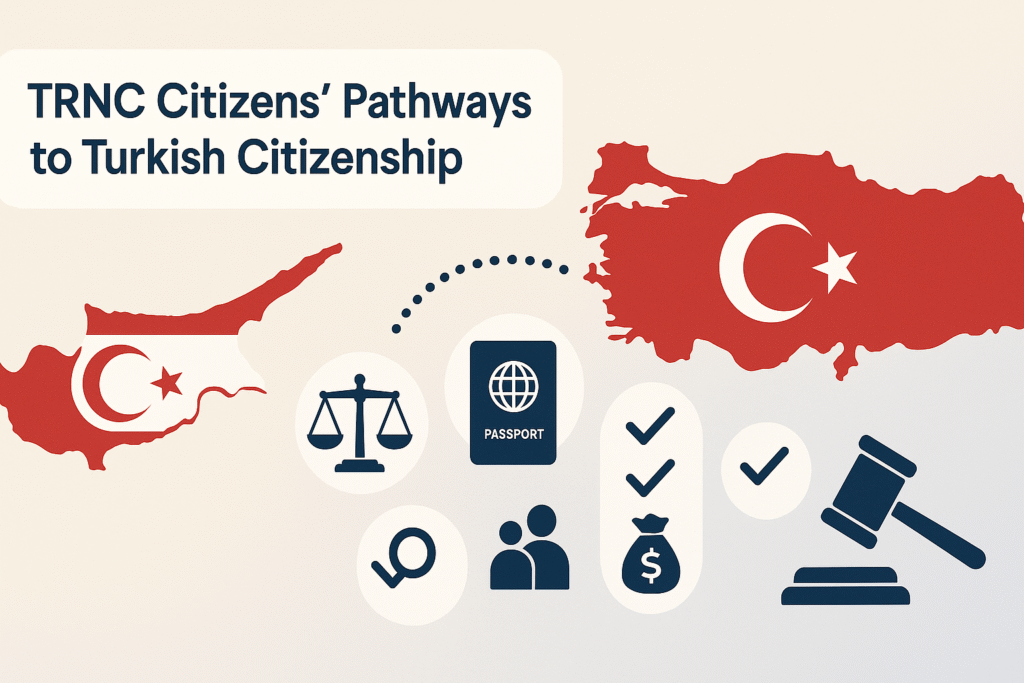INTIRODUCTION
TRNC citizens’ pathways to Turkish citizenship are not automatic; they proceed under Turkey’s Law No. 5901 (Turkish Citizenship Law), its Implementing Regulation, and—for residence prerequisites—the Law on Foreigners and International Protection (No. 6458). In practice, the legal grounds are clear, but outcomes hinge on documentation quality, continuous lawful residence, and security/background screenings administered by the Ministry of Interior (DG Population and Citizenship Affairs) with input from provincial authorities.

LEGAL BASIS AND STATUS OF TRNC NATIONALS
TRNC nationals are treated as foreign nationals for citizenship purposes unless they already have Turkish citizenship by descent. Accordingly, applications rely on the general framework of Law No. 5901 and the Implementing Regulation. Where residence, work authorization, or long-term stay is relevant, the LFIP (No. 6458) and secondary legislation (e.g., rules on work permits) apply. The administrative authority enjoys discretion, but that discretion is reviewable by administrative courts.
PRINCIPAL ROUTES TO ACQUISITION
(1) General Naturalization (Art. 11): Requires five years of continuous lawful residence immediately before application, intention to settle in Turkey, sufficient income or profession, good morals, basic Turkish language ability, and no threat to public order or national security.
(2) Acquisition by Marriage (Art. 16): Marriage to a Turkish citizen for at least three years, with the condition that the marital union is intact (no sham), spouses live together, and there is no conduct threatening the union.
(3) Exceptional Acquisition (Art. 12): For persons deemed to contribute to Turkey in science, technology, economy, culture, or sports, or who meet investment-based criteria fixed by regulation; eligible spouses and minor children may be included.
(4) Re-Acquisition (Art. 13): For those who previously held Turkish citizenship and lost it by competent decision; conditions differ depending on how citizenship was lost.
(5) By Descent (Art. 7): Where a parent is Turkish, proof of lineage and civil status records may support recognition rather than naturalization.
RESIDENCE AND DOCUMENTATION
Before naturalization, TRNC nationals typically need a valid residence basis (short-term, family, student, work, or long-term). Residence must be lawful and continuous; extended absences interrupt the clock. Core documents include a valid TRNC passport, birth and civil status records (properly legalized), clean criminal record(s), proof of income/means, health insurance, certified address registration, and evidence of language ability where applicable. Expect neighborhood/police verification, security vetting, and file-integrity checks by the governorate and the Ministry.
PRACTICAL PITFALLS AND EVIDENCE STRATEGY
Common pitfalls include gaps in residence, unreported address changes, informal employment, inconsistent identity data (e.g., name spellings, diacritics), and unrecognized foreign divorces or marriages (which may need recognition or annotation under private international law). Property acquisition alone does not confer citizenship unless it falls within an approved investment route. Meticulous file building—apostilles/legalizations, sworn translations, and coherent timelines—significantly reduces refusal risk.
REFUSAL, REVOCATION, AND JUDICIAL REVIEW
Even where statutory criteria are met, applications may be refused on public order/security grounds. Decisions can be challenged before administrative courts within statutory deadlines; applicants may seek a stay of execution where appropriate. Citizenship obtained through fraud or concealment is subject to annulment, with potential retroactive effects; third-party good-faith reliance is evaluated case-by-case under administrative and civil principles.
TIMELINES, FAMILY MEMBERS, AND COMPLIANCE
Processing times vary by route and province. Spouses and minor children may be added where the legal ground allows; however, each family member’s background vetting stands on its own. Post-acquisition, applicants should assess implications for military obligations, taxation, and reporting duties in both jurisdictions, and update population and civil status records promptly.
CONCLUSION
For TRNC nationals, the most reliable path is careful alignment with the statutory route that best fits their profile—general naturalization with continuous residence, bona fide marriage, or a duly structured exceptional route—supported by impeccable documentation and proactive compliance.
Turkish lawyer Ferhat Küle provides legal consultancy on TRNC citizens’ pathways to Turkish citizenship.
Yanıt yok